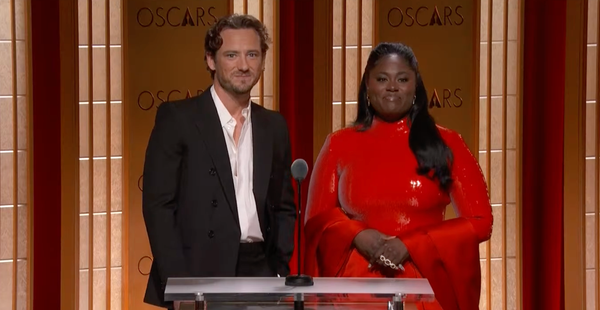It's the Summer of Half Movies and I'm Already Tired
A few thoughts on the phenomenon of watching half a movie in theaters.

This post will contain basic plot details for Spider-Man: Across The Spider-Verse.
Spider-Man: Across the Spider-Verse is one of the most beautiful films I have ever seen. Its animation is so formally inventive, so artistically dazzling, so technically daring that it makes its predecessor, Into the Spider-Verse (itself groundbreaking at the time), seem almost rudimentary by comparison. There were moments while watching Across the Spider-Verse where I felt like I was experiencing pure cinema as the film’s unique blend of imagery, sound, and storytelling carried me to new emotional heights.
It is also only half of a movie.
What I mean by that is that the movie ends on a massive cliffhanger with very few of its major plot threads resolved. Just as a reveal plays out on screen, the movie cuts to a big “TO BE CONTINUED” (in my theater, several people audibly gasped). If you want to know how Miles Morales gets out of his latest predicament, you’ll have to wait until Spider-Man: Beyond the Spider-Verse, currently slated for release in March 2024.
By ending in this way, Across the Spider-Verse joins Fast X and (presumably) Mission: Impossible - Dead Reckoning: Part 1 as one of several 2+ hour-long summer 2023 blockbusters that ends halfway through the story. And I just wanted to write this post to say: I’m mildly annoyed by it.
Filmmakers should get to tell their story however they prefer. If they think a story needs five hours instead of two, all the power to them. But I also think maybe giving people a warning would be nice? A little heads-up perhaps? At least with Dead Reckoning: Part 1, the fact that it’s incomplete is right there in the title. But if you don’t read movie blogs or follow Vin Diesel on Instagram, you’d probably have been pretty stunned at Fast X’s abrupt ending and I have to imagine a lot of people will feel the same way about Across the Spider-Verse.
The reason this phenomenon vexes me for Across the Spider-Verse in particular is because, unlike the mindless entertainment of Fast X, this is a movie that’s actually trying to say something. Across the Spider-Verse introduces a major plot point: There’s a whole crew of Spider-Men out from *ahem* across the multiverse and one of their goals is to maintain the multiverse’s integrity. But the way in which they do so is questionable and becomes a point of friction for the film’s protagonist, Miles Morales. The film raises brings up some fascinating ideas about fate, the value of protecting the status quo, and how we weigh that against the lives of those we love. But it doesn’t actually take a position on those things because the story isn’t finished yet. Now, I have some educated guesses about what the story’s ultimate stance is going to be about those topics. But also: these films have always surprised me so I legitimately don’t know what the message of this movie will be or the manner in which that message will be conveyed. And that makes it extremely difficult to evaluate!
As I reflected on Spider-Verse, I thought about all the Part 1’s I can remember watching in a theater. Dune was a fun surprise because none of the marketing indicated it would be a part 1 before you got to the theater and then the words Dune Part 1 appeared on screen (it was released in October 2021, while Part 2 will be out in November). When Avengers: Infinity War ended in April 2018, it sent me out into the theater lobby shell-shocked at what I’d just seen. We wouldn’t know how The Snap would be resolved until Endgame was released almost exactly one year later. Kill Bill was notoriously a single film before Quentin Tarantino proposed it be split into two (I’m still dreaming one day we’ll see a 4K Blu-Ray of The Whole Bloody Affair).
But probably the closest thing to Across the Spider-Verse I can recall is when The Matrix Reloaded rolled credits in 2003.
Like Across the Spider-Verse, The Matrix Reloaded also reconfigured the first film’s status quo in a way that made you question if the protagonist was even on the right side. It also ended with a major reveal, a cliffhanger, a kick-ass song cue, and it left its audience thinking: I really hope they stick the landing when the next one comes out.
If you enjoyed this post, consider subscribing!
Some Real Tom Wambsgans Energy
I was fairly horrified by CNN’s Town Hall with Donald Trump last month. As CNN’s own Oliver Darcy wrote:
It’s hard to see how America was served by the spectacle of lies that aired on CNN Wednesday evening. […] A professional lie machine, Trump fired off falsehoods at a rapid clip while using his bluster to overwhelm Collins, stealing command of the stage at some points of the town hall. Trump lied about the 2020 election. He took no responsibility for the January 6 insurrection that those very lies incited. And he mocked E. Jean Carroll’s allegations of sexual assault, which a jury found him liable for on Tuesday. And CNN aired it all. On and on it went. It felt like 2016 all over again. It was Trump’s unhinged social media feed brought to life on stage.
So it was with great interest that I read Tim Alberta’s fascinating profile of Chris Licht in The Atlantic. It’s a lengthy takedown that explains all the terrible decisions leading up to the Town Hall. Licht’s persona recalls Tom Wambsgans in Succession — an uninspiring leader who’s not terribly skilled but who remains where he is because the people at the very top support him (for now). He also seems completely oblivious to how he’s coming off — at one point in the profile, the journalist accompanies him to a gym, leading to this cringeworthy passage in which Licht disparages his predecessor, Jeff Zucker:
Three years ago, Licht weighed 226 pounds. Worried that he was losing control of his lifestyle, he went all in. No more breakfast. No drinking during the week. No more carbs or sweets. (“I’m a fucking machine,” Licht told me one day, when I asked why he was skipping a meal.) He also found Maysonet, whose gym, J Train, caters to New York’s elite—actors, athletes, business tycoons. On this morning, in March 2023, the CNN boss was down to 178 pounds. Licht jumped off the machine. At Maysonet’s instruction, he squatted down to grab a long metal pole lying flat on the ground. “Zucker couldn’t do this shit,” Licht said through clenched teeth, hoisting the pole with a grunt.
Zucker, it seems, might disagree.
The meta story of The Atlantic profile is about a subject who either had an extremely high estimation of himself or perhaps someone who trusted the journalist so much that he couldn’t possibly conceive of how negative the final piece would be. Regardless of his actual qualifications, Licht definitely needs a better handler.
Other Stuff David Chen Has Made
- On Decoding TV, we discussed the series finale of Succession. It was a fun chat and I feel blessed to have been able to watch this show and cover it with such an engaged audience.
- Also on Decoding TV, I was thrilled to speak with Patrick Klepek about the series finale of Barry. I was much more mixed on Barry than Succession this season but it definitely takes some big swings.
- On my YouTube channel, I explained how Netflix is ending password sharing.
- On The Filmcast, we reviewed The Little Mermaid. We also debated whether or not Mantis is evil.
- [PAID ONLY] If you’re a patron of The Filmcast, you get our Across the Spider-Verse review early!



